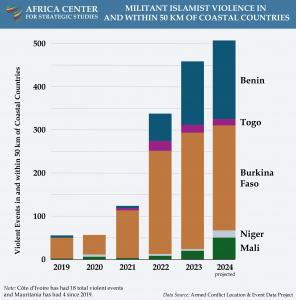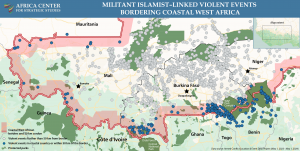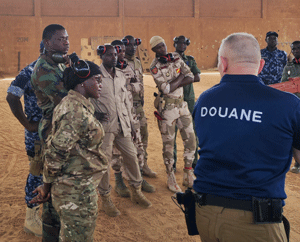A Borders Academy for Benin
30 October 2024
By Simon Izac, French Customs and Idrissou Imorou, Benin CustomsFor more than 10 years, counter-terrorism units have been witnessing the establishment of caliphates by jihadist groups in the Sahel. Although the activities of militant Islamist groups were initially focused on Mali, they have gradually shifted towards the west and south of Burkina Faso and spread across borders into neighbouring coastal countries. As well as diversifying their methods and tactics, these factions have extended their territorial control since 2017, with an attendant increase in loss of human life. Since the majority of incidents occur within 50 km of a border, these border areas are of particular significance.

Benin has been hit hard by acts of violence perpetrated by militant Islamist groups, with the number of recorded deaths having doubled over the past year to reach a total of 173. Operation Mirador has seen the deployment of 3,000 soldiers in Benin to patrol the border areas and counter the increasingly frequent phenomenon of attacks by Islamist militants on communities, law enforcement authorities and forest rangers. The country is also cooperating with Côte d’Ivoire, Ghana and Togo under the aegis of the “Accra Initiative”, which involves sharing information, intelligence and resources.
Groups of traffickers organized into networks have taken advantage of the situation to step up their illicit activities (trafficking in arms, drugs and human beings etc.) in the border areas of the region and of Benin.

Against this background, in October 2023 the authorities in Benin and France decided to set up a Borders Academy in Benin. Its purpose is to train the armed services that intervene in border areas – police officers, officials from the forestry and Customs services and members of the defence and security forces – to enable them to act in a coordinated manner to counter the various armed groups and dismantle illicit networks, while protecting local communities and building a climate of mutual trust.
In particular, this will involve:
- fostering the interoperability of the various armed services;
- encouraging the conduct of joint operations and the sharing of information at national and regional level;
- establishing the coordinated management of borders, drawing on the added value of each individual involved and balancing enforcement with support for economic activity and assistance for border populations living in these areas.

The Academy has been set up with the help of the French Ministry of Europe and Foreign Affairs, and, in particular, its Security and Defence Cooperation Directorate (DCSD), whose aim is to contribute to skills development within the armed forces, internal security forces and civil protection forces of partner countries. Training – organized both in France and abroad – has been the DCSD’s preferred mechanism for achieving this goal.
The Borders Academy in Benin thus forms part of an extensive network of around 20 “region-specific national training centres”, which are governed by the national law of the host country and operate on the basis of an agreement establishing a close partnership with the DCSD. The precise details of the partnership vary widely from one training centre to the next; France may be involved directly, in which case a French expert will be seconded to work within the institution, or indirectly, via financial backing, the donation of equipment or the deployment of experts on one-off teaching assignments. The first French adviser was seconded to Benin from the French Customs Administration by the DCSD in February 2024; in October, he will be joined by a French police officer.

The Academy has a Management Board whose members include representatives of the founding countries (Benin and France). This Management Board might be expanded to include active and associate members who contribute financially to the Academy. The orderly functioning of the Academy will fall within the remit of a managing director, a deputy director, a director of studies (responsible for training-related matters) and the members of a “support” directorate. A scientific board made up of representatives of training recipients (the partner administrations and the Benin Agency for the Integrated Management of Border Spaces (ABeGIEF)) will be set to work on the task of improving educational content.
Benin’s Agency for the Integrated Management of Border Spaces and other governmental institutions responsible for promoting and coordinating activities relating to the integrated management of border spaces will be involved in the project. It should be noted that border management was made a national priority, and a National Programme for the Integrated Management of Border Spaces was developed back in 2007, with the Agency placing particular emphasis on the following: the establishment of community and security infrastructures, capacity-building in the context of the defence and security forces and women-led income-generating groups, the organization of mobile consultations, the provision of various grants to border populations and the promotion of cross-border cooperation.
At regional level, a partnership could also serve as a rapid means of expanding the range of training courses offered by the International Academy for the Fight against Terrorism (AILCT) in Côte d’Ivoire.
Efforts are currently under way to establish cooperative arrangements at international level, with Germany, Italy, the United States and the European Union having shown a keen interest in the initiative. International institutions such as the World Customs Organization (WCO) and the International Organization for Migration (IOM) have also taken a genuine interest in the Academy.
In August 2024, the Benin Government – acting via the Ministry of Finance – allocated to the region-specific national training centre an area covering five hectares, located within an 18-hectare site in Porto Novo (the capital of Benin) that belongs to the Directorate-General for Customs.
The region-specific national training centre will be based in Cotonou until the relevant infrastructures are in place, and the first training courses are planned for the end of 2024. The future training curricula and the proposed course catalogue are currently the subject of in-depth debate. If a dozen or so training courses were organized in 2025, this would mean that a cohort of over 300 individuals could receive training. There are also plans to pilot remote “train-the-trainer” sessions on geospatial data analysis and cartography, with around 60 attendees.
The DCSD and the Borders Academy are also working to establish technical and financial partnerships. Potential partners are encouraged to contact them.
More information
https://www.linkedin.com/feed/
https://x.com/Adfrontbenin
https://academiedesfrontieres.net/
https://www.abegief.bj/
Regarding the region-specific national training centres supported via cooperation with France:
https://www.diplomatie.gouv.fr/IMG/pdf/livret_envr_-_2024_-_vfinale_3_cle0431e1.pdf


